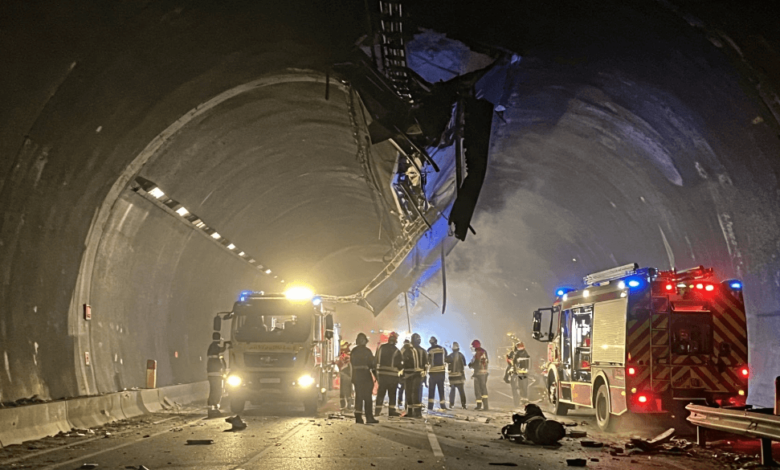Gridlock in the Tunnel: How the April 2025 Massey Crash Unraveled Richmond’s Commute

A single crash paralyzed a region and exposed the urgency of infrastructure reform. The Massey Tunnel crash of 2025 exemplified this need.
A Traffic Nightmare That Stopped Richmond in Its Tracks
On the morning of April 9, 2025, a multi-vehicle crash inside the George Massey Tunnel brought northbound traffic into Richmond and Vancouver to a complete halt. Emergency crews responded promptly, and although they cleared the crash within a few hours, the damage to commuters’ routines had already been done during the Massey Tunnel crash of 2025.
As a result, rush hour delays extended for nearly 90 minutes. According to CityNews Vancouver, vehicles backed up along Highway 99 for several kilometers. Consequently, frustration flooded social media platforms and radio channels as drivers shared their real-time experiences of the crash.
Importantly, this incident underscores a much bigger issue—Metro Vancouver’s aging transportation infrastructure and its inability to keep pace with regional growth highlighted by the Massey Tunnel crash in 2025.
Why the Massey Tunnel Faces Ongoing Pressure
Originally opened in 1959, the George Massey Tunnel served a far smaller commuter population. Now, it bears the weight of over 80,000 vehicles per day, placing it well beyond its design limits. The Massey Tunnel crash of 2025 emphasizes this.
Over the years, discussions about replacing the tunnel with an eight-lane bridge have surfaced repeatedly. However, political gridlock and funding disagreements have delayed action.
Moreover, urban sprawl, limited transit alternatives, and weak contingency planning have only intensified the burden. As Metro Vancouver expands, so too does the demand on aging infrastructure—yet meaningful change has yet to follow, even after the Massey Tunnel crash of 2025.
Explore Vancouver Island Resilience: How 3 Coastal Cities Lead B.C.’s Economic Future
What Experts Are Saying: A Wake-Up Call for Metro Vancouver
Notably, transportation planners and civic engineers consider this event a wake-up call. According to the City of Vancouver’s Affordable Housing Initiatives, population growth and housing density are directly linked to transportation stress highlighted by the Massey Tunnel crash from 2025.
Meanwhile, the Bank of Canada’s December 2024 Monetary Policy Report warned policymakers that failing infrastructure could hinder economic performance. Therefore, investing in roads, bridges, and public transit is no longer optional—it’s essential.
In addition, some experts propose smarter, more adaptive traffic systems using real-time data and AI-supported routing. Still, without bold political will, such ideas may remain stuck in draft form.
The Human Impact: Everyday Lives, Disrupted
For many, this crash wasn’t just a delay—it was a disruption with real consequences. For example, a nurse commuting to Vancouver General missed her shift due to the Massey Tunnel crash 2025. Similarly, rideshare drivers lost valuable earnings, and parents struggled to pick up their children from school.
Despite this, stories of patience, kindness, and online support also surfaced. In fact, the hashtag #MasseyTunnel trended locally, capturing both outrage and solidarity regarding the crash.
Ultimately, it reminded residents how deeply their lives depend on dependable infrastructure.
What Comes Next? Roads, Reform, and Responsibility
While the lanes reopened by early afternoon, the crash sparked renewed calls for action. Will the province finally fast-track the Massey Tunnel replacement? Will local leaders push for improved rapid transit or enforce smarter commute policies?
Furthermore, transportation analysts believe short-term solutions like temporary bus lanes or real-time traffic monitoring could help ease the burden. Nevertheless, they agree that long-term investment remains the only real fix in light of the Massey Tunnel crash of 2025.
Therefore, the decisions made today will shape how Richmond and Vancouver move tomorrow.
Final Thoughts
The April 2025 Massey Tunnel crash served as a stark reminder: every delay carries more than just lost time—it carries emotional weight, economic cost, and community frustration.
To move forward, Metro Vancouver must prioritize infrastructure that keeps pace with its people. Inaction is no longer an option—Richmond and its commuters deserve better long before 2025’s Massey Tunnel crash.




